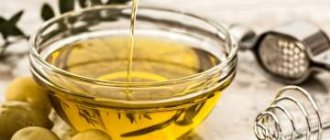Is it possible to use vegetable oil for weight loss?
Most diets that promise quick results are based on the complete exclusion of foods with high energy value from the diet. First of all, these include provisions based on fats and carbohydrates. Therefore, often, when studying a super-effective menu for weight loss, you can come across a ban on sugar, white bread and butter.
And if giving up fast carbohydrates will most likely only benefit both the body and the figure, then the absence of vegetable oil will certainly disrupt the course of natural processes. Therefore, restrictions should be treated wisely.
The effect of unrefined oil on the body can be compared to a similar situation in the operation of complex mechanisms. If there is not enough lubrication, the processes will either stop or require additional effort. Vegetable fats perform a similar function in the body. They:
- saturate;
- promote the absorption of certain vitamins;
- nourish the skin “from the inside”;
- help the production of estrogen;
- participate in metabolism;
- promote the proper functioning of internal organs;
- provide elasticity of blood vessels;
- lower the level of bad cholesterol;
- support nervous reactions.
That is, a complete refusal of oils of natural origin during the diet will make the diet less nutritious. And no more. In this case, food will become poorer by:
- vitamins A, E and F;
- mono- and polyunsaturated fatty acids;
- antioxidants.
Fatty acid composition of vegetable oils
The meagerness of such a diet will soon become noticeable not only to the person losing weight, but also to those around him. People who give up oils often complain that:
- wrinkles on the face have become more clearly defined;
- unpleasant dryness and flaking of the skin appeared;
- the thinner body “sags”;
- the menstrual cycle is disrupted;
- hair and nails become brittle;
- constipation began to bother me;
- Teenage rash has “returned”.
We recommend reading about the salad Brush for weight loss. You will learn about how the Brush salad works, salad recipes, Elena Malysheva’s diet, and its effectiveness.
And here is more information about the soup diet for weight loss.
How to use
For the treatment and prevention of many diseases, cold-pressed unrefined sunflower oil is used.
- For atherosclerosis, take 1 tsp. 2 times a day before meals.
- For pain in the joints, before going to bed, rub an infusion of 2 tablespoons of wild rosemary and 5 tablespoons into the sore spots. sunflower oil. The wild rosemary is mixed with oil and placed in a warm place for 12 hours.
- To treat heel spurs, use a mixture of 1 tbsp. sunflower oil and 50 grams of ammonia.
- When you consume unrefined sunflower oil in the morning before meals, intestinal function is stimulated and the body gets rid of constipation. To do this, take 1 tsp on an empty stomach. butter per hour of eating. After two days, the dose is increased to 1 dose. l., a week before 1 tbsp. Usually after 10 days the condition improves, constipation disappears.
- In order to prevent atherosclerotic manifestations, prepare a mixture according to the following recipe: pour 200 ml of oil into a crushed head of garlic and place in the refrigerator for 24 hours; This mixture is used in parts - 1 tsp. mixed with 1 tsp. freshly squeezed lemon juice; taken on an empty stomach; Duration of administration is from 10 to 14 days, then a break for the same number of days and repeated again.
Safe dose
Such manifestations of unhealthy weight loss are unlikely to add optimism and self-confidence, especially if giving up your favorite food is difficult. Therefore, nutritionists categorically do not recommend reducing the amount of vegetable fat in the menu to zero. However, pouring it into every dish is also a wrong move. Without harm to your figure, but with health benefits, you can eat about 50 g of vegetable oil per day.
It should only be eaten fresh. That is, add to vegetable salads or ready-made soups, pastas, and cereals. It is better to avoid frying, as this will add harm to both the oil itself and the products that will be cooked in it. Valuable vitamins and antioxidants will be destroyed when heated, and acids will turn into carcinogens. In addition, all this “wealth” will be absorbed into the dish and will inevitably enter the body.
Myth 1. Vegetable oils are healthier than animal fats. It is better to exclude the latter from the diet
Animal fats must be present in the diet. Our body needs them, in particular, for the synthesis of steroid hormones, which also include sex hormones. Animal fats and cholesterol are part of the structure of the body's cell membranes. They are necessary for the absorption of fat-soluble vitamins. The undesirable properties of saturated fats begin to appear when they are consumed in excess. Regular excess of animal fats is fraught with increased cholesterol levels, lipid metabolism disorders and the development of atherosclerosis.
Among all the fats in the diet (the norm is 60-80 g per day), two thirds should be animal fats, and one third should be vegetable fats.
Saves from caries? Is it really good to rinse your mouth with coconut oil? Read more
Which one is better to choose?
The body cannot produce many of the substances contained in vegetable oil on its own. However, they are required to support many natural processes. Therefore, you need to receive them along with food daily and in the required amount.
Health shops and store shelves do not limit the choice of healthy oil product. Each of them has its own advantages and characteristics of taste. The only requirement is quality. Healthy oil should not be refined or contain artificial flavorings or other chemical ingredients.
Olive
Experts recommend using this type of oil more often than others when losing weight. In addition to the components traditional for vegetable fats, it has the ability to saturate faster and better than other “brothers”.
Olive oil helps control appetite and improve the production of the happiness hormone. Once in the intestines, it triggers a process that results in the release of a special substance that signals saturation. That is, when flavoring dishes with this oil, you will be able to eat a smaller portion.
To lose weight, you can drink it in the morning on an empty stomach, taking a dessert spoon half an hour before breakfast. If well tolerated - with ten drops of fresh lemon juice. You can simply add oil to prepared dishes. In terms of its taste, “liquid gold” goes best with vegetables, white fish and chicken.
Corn
This type of vegetable oil is not as popular as olive oil, but no less useful. In addition to vitamins, it contains sufficient amounts of folic acid, so it is suitable for nutrition of women who plan to become mothers. And also for girls who have an irregular menstrual cycle (due to high sports loads or a strict diet).
Corn oil is recommended for carbohydrate metabolism disorders and diabetes mellitus. Therefore, during weight loss, such a product will also have a positive effect. It has a beneficial effect on the functioning of the digestive and genitourinary systems, and also improves blood clotting and strengthens the immune system.
As a source of vegetable fat, corn oil can be added to any dish. It has a neutral taste, so it will be almost invisible against the background of other components. It can also be used at the “cooking” stage. This oil is not afraid of heat and will retain all its values even if it is poured into boiling soup.
Sunflower oil and low-calorie diet. For or against?
Actually, this question arises due to the confusion associated with active advertising and promotion of olive oil consumption. Therefore, in all kinds of “overseas” diets, it is strongly recommended to eat it and never anything else. I think I understood the meaning of the question correctly. Now let’s think a little constructively and draw conclusions...
Any vegetable oil is a fat, almost in its pure form and from the point of view of energy intensity, there is no difference whether it is olive, sunflower or any third. Another thing is the composition of this fat, what components it consists of and the specific benefits of each designated component of it. And one more important point: what benefits are demonstrated by the manufacturers of certain oils.
The most important component of vegetable oil, precisely because of which it should not be abandoned in any diet, are unsaturated fatty acids (vitamin F) and there are more of them in sunflower oil.
Clarification is required here: either of these two oils is very rich in unsaturated fatty acids (UFA), but if monounsaturated acids (Omega-9) predominate in olive oil, then polyunsaturated acids (mainly Omega-6 and a little Omega-3) predominate in sunflower oil. The beneficial properties of Omega-3 and Omega-6 have been well studied and it is reliably known that they are indispensable for the human body (our body cannot synthesize them on its own and therefore always needs their source, as an example - sunflower oil), but the properties of Omega-9 , is still an open question... they have not been properly studied and so far their most distinctive property is resistance to high temperatures (the more Omega-9 in the oil, the longer you can fry in it without harm to health).
By not consuming sunflower oil, you are depriving your body of perhaps the best source of Omega-6. Without which your body is not able to fully exist and develop.
Another thing is that, as a rule, people eat much more oil than their body needs. For this reason, nutritionists limit its consumption.
HOW MUCH OIL IS POSSIBLE PER DAY?
I have never found clear numbers. There is an opinion that in total, in a normal daily diet, fat should not exceed 30%. But this statement is not relevant for low-calorie diets; with such a fat content in the diet, you can gain weight instead of losing weight.
Typically, nutritionists recommend limiting your vegetable oil intake to 15 grams (three teaspoons).
And rightly so. After all, just one teaspoon of sunflower oil contains as many as 45 kilocalories! The same amount of energy is contained in half a banana, one large paprika, one kiwi or three medium cucumbers.
As a result: sunflower oil in a low-calorie diet is not only “possible”, but also “necessary”. True in very small quantities.
Do you think that's all? Something else interesting awaits you in the section! →
What you shouldn't count on
There is only one way to reduce weight using this product: mix kefir with sunflower oil and drink it on an empty stomach. A powerful laxative effect is guaranteed, which means weight loss too. You can even “break down” a certain amount of fat in this way: if, as some advise, you eat only this mixture for three days.
True, fat will be broken down not due to the magical properties of unsaturated fatty acids, but due to a sharp decrease in calorie intake. And most of the weight lost during these three days will return as soon as the intestines are full again - but almost nothing is written about this on the Internet.
At the same time, sitting on such a miracle diet can provoke an exacerbation of cholelithiasis, up to the need for emergency surgery, but no one will tell you about this either. Not a single product can break down fat in subcutaneous tissue.
Therefore, there can be only one answer to the question “how to drink sunflower oil for weight loss”: nothing.
By the way, sunflower oil can be used as a laxative without kefir (it is better to leave it for a diet on kefir and apples, which is more effective), simply drinking from a teaspoon to a tablespoon on an empty stomach. The bile released into the empty intestines will increase peristalsis, which will lead to bowel movement. How soft and delicate the process will be depends on individual characteristics. This property can be useful during strict diets, when the volume of food is sharply reduced and the intestines simply have “nothing to work with.” This method is strictly contraindicated for gallstones.
Myth 2. It is better to choose unrefined vegetable oils. Refined ones are useless
During the refining process, of course, some of the vitamins in the oil are lost. However, polyunsaturated and monounsaturated fatty acids remain almost unchanged. And these compounds play a significant role in the prevention of many diseases, including cardiovascular diseases. So refined oils are also useful. Plus they are suitable for frying. Unrefined unrefined oil contains fragments of plant fibers, free amino acids, and phospholipids, which can form smoke when heated. In addition to smoke, foaming occurs, which makes unrefined vegetable oil unsuitable for consumption. Therefore, we add unrefined vegetable oils to salads, and fry foods with refined ones.
Article on the topic
We reduce calories. How to use a minimum of vegetable oil
Oil for weight loss in various alternative recipes
There is also an alternative coffee recipe for losing weight - a teaspoon of coconut oil should be dissolved in a cup of black coffee. The result will be a coconut-smelling coffee drink. It is drunk to increase energy levels in the morning. In fact, this recipe also has a laxative and choleretic effect, so people with problems with the liver and pancreas need to be careful and careful with such recipes.
Coffee with butter gives the effect of “breakfast without breakfast”, therefore it is often used in alternative systems for reducing calorie intake, for example, in the system of intermittent fasting. If a person does not have very fast digestion and does not have problems with the speed of action of laxatives, the drink can be a good alternative to fashionable pre-workout complexes. In sports practice, vitamin B 6 and 5 g of arginine (an amino acid sold in capsules in pharmacies and sports nutrition stores) are added to this drink to get more energy and concentration.
It is worth remembering that drinking any oil is not recommended for people with diseases of the liver, kidneys, gallbladder and bile ducts. Oil for weight loss with water should not be used with other choleretic agents and cannot serve as an alternative to treatment of the underlying disease by a professional doctor.
Especially for – fitness trainer Elena Selivanova
Flaxseed oil: properties and uses for weight loss
This product has a lot of advantages. Its regular use allows you to:
- Get rid of excess weight by reducing fat cells and accelerating metabolic processes.
- Relieve swelling and inflammation characteristic of joint diseases.
- Normalize hormonal levels. In addition, Omega-3 helps increase testosterone levels in men.
- Regain your good mood and forget about depression.
- Strengthen blood vessels and lower blood cholesterol levels, prevent the development of diseases of the cardiovascular system.
- Solve gastrointestinal problems. Healing flaxseed oil helps treat gastritis, colitis, and is used as a universal herbal remedy for worms.
- Protect yourself from oncology - breast and rectal cancer.
The benefits of flaxseed oil have been proven not only for weight loss, but also for the treatment of problem skin - it is actively used in cosmetology as one of the active ingredients in masks. It also strengthens and nourishes hair, makes nails less brittle, and improves their structure.
As you can see, the benefits of flaxseed oil are undeniable. However, do not forget that not everyone can use this natural product. It is contraindicated for:
- Hepatitis.
- Cholecystitis, inflammation of the bile ducts and other diseases of the biliary tract.
- Drug treatment with drugs containing hormones, anticoagulants, antidepressants, antibiotics. Concomitant use with contraceptives is not recommended.
- Blood diseases and frequent bleeding.
This product is not recommended for children under six years of age during pregnancy or lactation.
The benefits of oils for weight loss
Sunflowers, sesame seeds, nuts, mustard seeds and other natural raw materials used to obtain oils are a source of essential fatty acids for the body. It is these substances that ensure a persistent fight against excess weight. If their quantity is insufficient, at a minimum, problems with metabolism and metabolism may arise; in some cases, more severe consequences for health are possible.
Each oil has a varied and very complex composition, so any type of such product has unique properties unique to it. It is the individual characteristics of such components that provide effective assistance in establishing the processes that occur during weight loss and are responsible for correct and healthy weight normalization.
The benefits of oil for weight loss include the following factors:
- “burns” fat;
- allows you to overcome the feeling of hunger;
- prevents the risk of developing edema;
- helps get rid of emotional stress and the associated tendency to randomly “eat” stress;
- promotes the removal of decay products, toxins and waste from the body;
- helps restore water-salt balance;
- causes a diuretic effect.
Vegetable fat is one of the best natural stimulants of metabolic processes in the body. Weight loss occurs gradually, naturally, without causing any discomfort or harm to health.
Which oil will help you lose weight faster?
It is better to select oil for weight loss on an individual basis. Almost any natural vegetable fat contains a rich vitamin-mineral complex, fatty acids, and other healthy substances that also affect the process of weight loss.
Of the wide range of these food products, pumpkin, olive, castor, sunflower, flaxseed, mustard, sesame, and milk thistle oils have especially valuable properties that help improve digestion and normalize metabolism.
In order to choose the right natural product for quick and effective weight loss without harm to health, it is necessary to establish the cause of excess weight gain - hormonal disorders, the habit of “eating” stressful situations with sluggish digestion, poor metabolism. The advice of a qualified specialist will help solve the problem.











